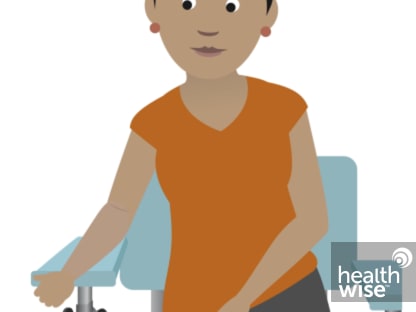Test Overview
The inhibin A test is done to measure the amount of this hormone in a pregnant woman's blood to see if the baby may have Down syndrome. Inhibin A is made by the placenta during pregnancy.
The level of inhibin A in the blood is used in a maternal serum quadruple screening test. Generally done between 15 and 22 weeks, this test checks the levels of four substances in a pregnant woman's blood. The quad screen checks alpha-fetoprotein (AFP), human chorionic gonadotropin (hCG), a type of estrogen (unconjugated estriol, or uE3), and the hormone inhibin A. The levels of these substances—along with a woman's age and other factors—help the doctor estimate the chance that the baby may have certain problems or birth defects.
Why It Is Done
A test for inhibin A is done in addition to other tests to see if there is a chance of chromosome problems, such as Down syndrome.
How To Prepare
In general, there's nothing you have to do before this test, unless your doctor tells you to.
How It Is Done
A health professional uses a needle to take a blood sample, usually from the arm.
Watch
How It Feels
When a blood sample is taken, you may feel nothing at all from the needle. Or you might feel a quick sting or pinch.
Risks
There is very little chance of having a problem from this test. When a blood sample is taken, a small bruise may form at the site.
Results
A normal result means that the level of the hormone inhibin A is low, or negative. An abnormal result means the level of the hormone inhibin A is high, or positive.footnote 1 The level of the hormone must be reviewed with the quad screen blood tests.
All abnormal results will need to be discussed with your doctor.
Related Information
References
Citations
Credits
Current as of: April 30, 2024
Author: Ignite Healthwise, LLC Staff
Clinical Review Board
All Ignite Healthwise, LLC education is reviewed by a team that includes physicians, nurses, advanced practitioners, registered dieticians, and other healthcare professionals.
Current as of: April 30, 2024
Author: Ignite Healthwise, LLC Staff
Clinical Review Board
All Ignite Healthwise, LLC education is reviewed by a team that includes physicians, nurses, advanced practitioners, registered dieticians, and other healthcare professionals.


